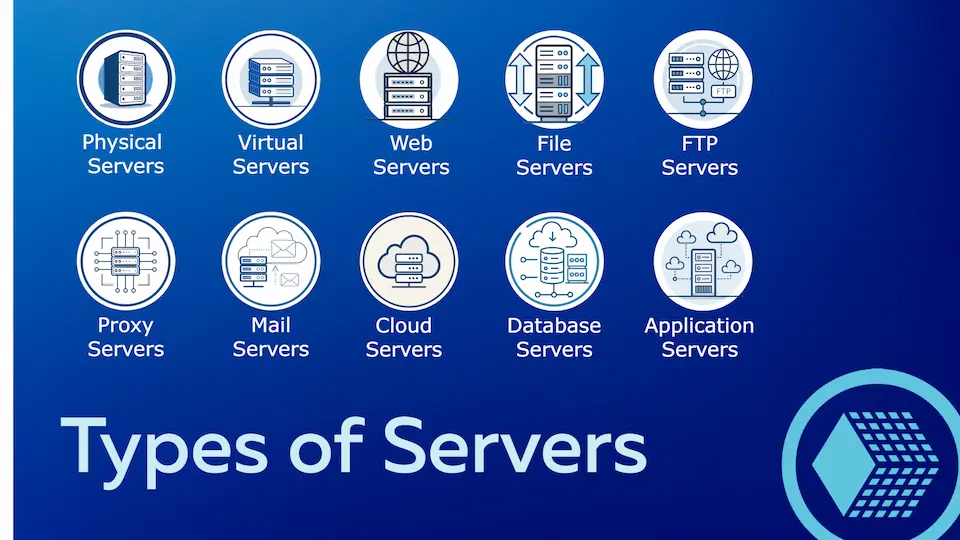2025-09-04 17:49:00
Handy Backup
Different types of servers form the foundation of modern IT infrastructure — supporting everything from websites and cloud platforms to internal communications and secure data storage. While early various server types were primarily used for simple file sharing, today’s systems operate as core components of complex, distributed environments.
Each server type is designed to perform a distinct function: processing requests, storing critical information, managing user interactions, or protecting digital assets. Understanding how these server types work helps businesses of all sizes — from educational institutions to accounting departments — build secure and efficient IT ecosystems.
Web servers are essential components of the internet ecosystem. Among the various types of servers in networking, they handle requests from browsers and deliver web pages, applications, and content to users worldwide. Acting as intermediaries, they facilitate communication between clients and the resources hosted on servers, ensuring that websites and web applications function smoothly and efficiently.
When a server fails, the impact goes far beyond just IT — it disrupts the entire business ecosystem.
Here are the key outcomes companies face during server crashes:
- Technical Characteristics: Web server type uses HTTP and HTTPS protocols to deliver both static files like HTML and images, as well as dynamic content generated by scripting languages such as PHP or ASP.NET. These different types of web servers efficiently handle multiple simultaneous connections and often support SSL/TLS encryption for secure data transfer. Web servers work on various operating systems, including Linux and Windows Server.
- Strengths and Unique Capabilities: Web servers are highly scalable, supporting everything from small websites to high-traffic portals. Their modular
design allows adding extensions to enhance performance and security. Built-in caching speeds up content delivery, while load balancing distributes traffic to maintain
stability. Strong security features protect against common web threats.
- Typical Use Cases: Web servers host websites — from simple pages to complex applications — and support e-commerce platforms
with secure transactions. They are essential for content management systems like WordPress and serve as endpoints for APIs and web services, enabling
communication between applications.
Among the many types of servers, file servers provide centralized storage, allowing users to save, organize, and share files within a network efficiently. They manage permissions and access controls to ensure data security and streamline collaboration. FTP servers specialize in transferring files over the internet or local networks using the File Transfer Protocol, facilitating reliable and fast data exchange between clients and various server types.
- Technical Characteristics: File servers support various storage technologies and protocols to handle large volumes of data with high availability. The FTP server type operates over TCP/IP, providing features like user authentication, file encryption (in secure variants), and resume support for interrupted transfers. Both types are compatible with multiple operating systems and can be configured for local or remote access.
- Strengths and Unique Capabilities: File servers simplify data management by centralizing files and controlling access, which enhances security and reduces duplication. FTP servers excel in transferring large files and automating batch uploads or downloads. Secure FTP variants add encryption, protecting data during transfer. Together, they enable efficient and safe file sharing across diverse environments, especially when secured with efficient FTP backup protection.
- Typical Use Cases: File servers are widely used in offices and organizations to support teamwork and document management. The FTP server type serves web developers, content distributors, and IT professionals who need to move files between systems quickly and securely. Both are essential for distributing software, enabling remote file access, and maintaining organized, centralized data storage.
Database servers are a key part of various types of servers used in modern IT environments. They store and manage structured data, enabling fast, reliable access for a wide range of applications. These servers are essential for tasks like querying, updating, and securing information across business systems. Application servers, on the other hand, run business logic and process user requests. Acting as a bridge between client interfaces and databases, they ensure smooth operation of services by coordinating data access and application workflows.
- Technical Characteristics: Database servers include various database management systems such as MySQL, PostgreSQL, and Oracle, offering features like transaction integrity, query optimization, and data replication. Application servers provide runtime environments for applications, supporting multiple programming languages and middleware technologies, along with load balancing and failover capabilities.
- Strengths and Unique Capabilities: Database servers deliver high-speed data processing and ensure data reliability. The application server type centralizes business logic, making it easier to scale and maintain applications. Both server types support clustering and redundancy to enhance fault tolerance, especially when combined with reliable application backup software.
- Typical Use Cases: Database servers are commonly used in enterprise systems such as ERP (Enterprise Resource Planning), CRM (Customer Relationship Management), and financial platforms where fast and reliable access to structured data is critical. Common database server examples include MySQL, PostgreSQL, and Oracle, which are widely used across industries. Application servers execute business logic and handle user requests, acting as intermediaries between client applications and databases to ensure smooth service operation.
Mail servers manage the sending, receiving, and storage of email communications, supporting protocols like SMTP, IMAP, and POP3 to ensure reliable message delivery and user access. Proxy servers act as intermediaries between clients and other servers, providing functions such as caching, filtering, and enhancing security by controlling access and hiding internal network details. So, what types of servers are there beyond these? Other specialized servers include print servers that manage networked printers, game servers hosting multiplayer sessions, and domain controllers handling user authentication and policy enforcement.
- Technical Characteristics: Mail servers implement email protocols and often include spam filtering, virus scanning, and encryption to protect communications. Proxy servers handle network requests efficiently, offering content caching, access control lists, and support for various protocols like HTTP and SOCKS. Specialized servers vary widely but typically focus on specific services with tailored configurations and resource management.
- Strengths and Unique Capabilities: The mail server type ensures timely and secure email flow critical for business communications. Proxy servers improve network performance and security by reducing bandwidth usage and blocking malicious traffic. Specialized servers provide focused functionalities that optimize particular tasks, such as centralized printer management or real-time multiplayer gaming.
- Typical Use Cases: Mail servers support corporate and personal email systems. Proxy servers are used in organizations to monitor and control internet access or accelerate content delivery. Other specialized servers are deployed in offices for printer sharing, in gaming communities for hosting matches, and in IT environments for managing user credentials and permissions.
Various types of servers face unique server security risks based on their functions and exposure. Web servers, for example, are vulnerable to DDoS attacks and web-based exploits due to their constant internet presence. File and FTP server types risk unauthorized access and data theft if not properly secured, making FTP server security risks a particular concern. Database servers may suffer from injection attacks or data breaches, especially when linked to public web services. Even specialized computer server types — like mail or proxy servers — can be exploited for spam, phishing, or to bypass network restrictions.
Understanding these server threats enable organizations to implement effective server protection measures. Applying targeted server security measures, such as firewalls, encryption, and access controls, helps to protect servers according to their specific vulnerabilities and roles. A well-planned protection strategy is essential to minimize risks and maintain a secure IT environment.
Efficient server protection involves regular copies of critical information, secure storage, and automated processes to minimize human error and downtime. Implementing a reliable physical server backup software helps centralize control, simplify recovery, and maintain the integrity of your valuable assets.
Handy Backup offers a powerful and easy-to-use server backup tool designed to safeguard your server data with flexible scheduling, encryption, and support for various storage destinations. It’s perfectly suited for both small business environments and complex enterprise systems.
Key features include:
- Automated server backups with custom scheduling and retention policies
- Support for databases, virtual machines, and system images
- Data transfer to local drives, NAS, FTP/SFTP, and cloud storage
- AES-256 encryption for secure data protection
- Centralized management and email notifications for seamless server crash recovery and task monitoring
Version 8.6.7 , built on November 26, 2025. 153 MB
30-day full-featured trial period
Experience the benefits firsthand by downloading the free 30-day trial today and take the first step towards secure, hassle-free data protection tailored to your business needs — no matter which types of servers you rely on.
Frequently Asked Questions on Computer Server Types
- What are the different types of servers?
Various types of servers include web servers, file and FTP servers, database servers, application servers, mail servers, proxy servers, and other specialized systems like print or game servers. Each type serves a distinct role — whether it's delivering web content, managing data, handling emails, or facilitating internal communication and security. Handy Backup offers tools to help manage and ensure effective server protection across all these server types, supporting stability, performance, and continuity for businesses of any size.
- What are the types of server security threats?
Server security threats vary depending on the server’s function and exposure. Common threats include DDoS attacks targeting web servers, unauthorized access or data theft affecting file and FTP servers, injection attacks and data breaches on database servers, and spam or phishing attempts exploiting mail and proxy servers. Understanding these threats is essential to apply effective security measures tailored to each server type. Handy Backup helps protect server data against these threats by providing reliable and automated data protection tools designed for various server environments, ensuring business continuity and minimizing server security risks.
- What challenges do businesses face when managing various types of server in a distributed environment?
Managing different categories of server in a distributed environment can be complex due to differences in hardware, software, security requirements, and data management needs. Challenges include ensuring consistent security policies, maintaining reliable server data protection, coordinating backups across diverse systems, and minimizing downtime. Additionally, monitoring and troubleshooting issues across multiple types of server requires specialized tools and expertise. Handy Backup simplifies this process by offering centralized management and flexible data protection solutions compatible with multiple server types, helping businesses streamline operations and safeguard critical data in distributed setups.


